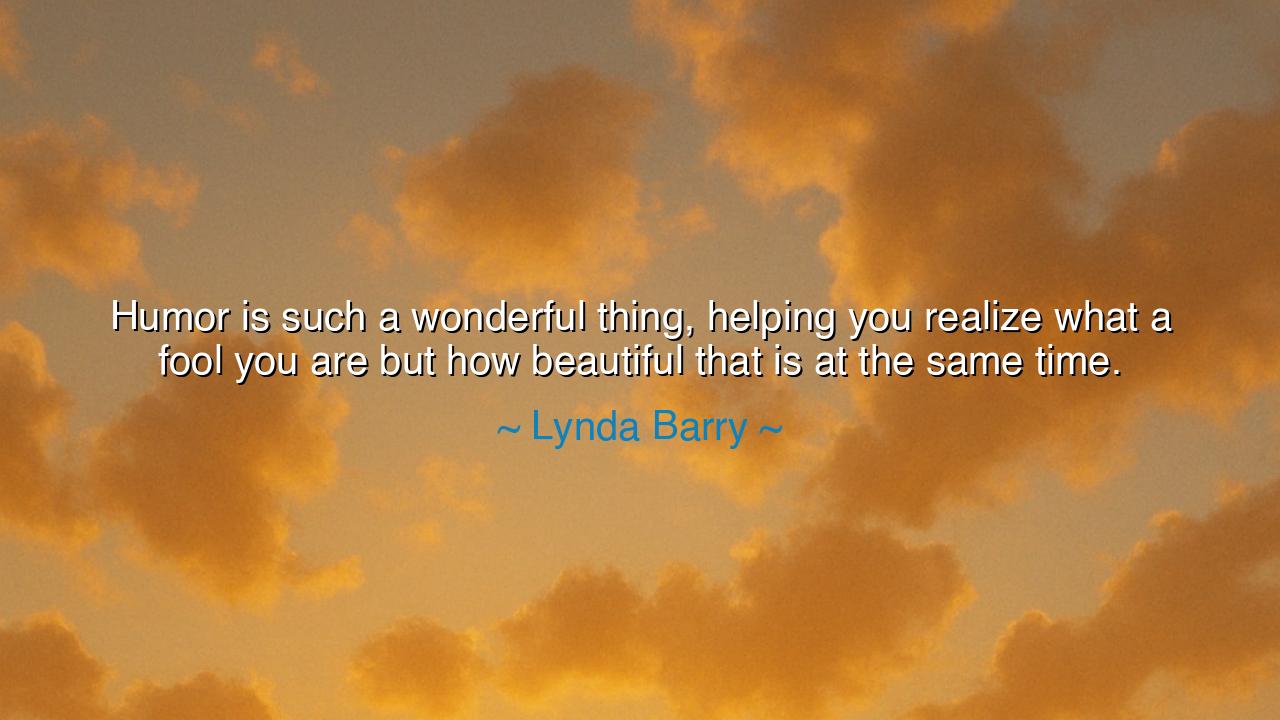
Humor is such a wonderful thing, helping you realize what a fool
Humor is such a wonderful thing, helping you realize what a fool you are but how beautiful that is at the same time.






In the luminous words of Lynda Barry, artist and truth-teller of the human soul, we find a revelation both tender and profound: “Humor is such a wonderful thing, helping you realize what a fool you are but how beautiful that is at the same time.” This is no light jest, no passing remark meant to amuse—it is the voice of wisdom speaking through laughter. For in her words lies a truth the ancients knew well: that humor is not merely the art of laughter, but the art of humility. It is the gentle mirror that reveals our folly, not to shame us, but to remind us that imperfection itself is holy.
The origin of this quote is born from Barry’s lifelong devotion to storytelling—her work as a cartoonist, writer, and teacher reveals a deep reverence for the messy brilliance of human life. Her humor has never been the humor of mockery, but of compassion: she laughs with humanity, not at it. Through her art, she shows that to see one’s foolishness clearly is not to despair, but to awaken—to recognize the fragile, ridiculous, and yet breathtakingly beautiful nature of being alive. When she calls us “fools,” she speaks with love, for to be foolish is simply to be human, and to laugh at that truth is to be free.
The ancients understood this paradox well. Socrates, the wisest of the Greeks, called himself ignorant, and in doing so became the very symbol of wisdom. He laughed at the certainty of men, knowing that arrogance is the true folly. His humility was his humor—a laughter born of awareness that life is too vast for any single mind to contain. Likewise, Lynda Barry’s words remind us that humor is a bridge between wisdom and innocence, between knowing and not knowing. It humbles us, yet lifts us; it shows us how small we are, yet how grand the very act of being small can be.
Consider the story of Charlie Chaplin, that silent poet of motion. In his tramp’s tattered coat and bowler hat, he stumbled through a world that mocked him, yet he never ceased to smile. His art revealed that beneath the surface of clumsy mistakes and human misfortune lay something divine—a resilience, a joy that could not be crushed. Through humor, he showed the world that our foolishness is not failure but proof of our aliveness. Chaplin’s laughter was the same laughter that Barry describes: the kind that says, “Yes, I am a fool—but what a beautiful fool I am, for I still love, still hope, still try.”
This, then, is the sacred gift of humor: it disarms pride, softens pain, and reconciles us with our own fragility. In the ancient temples of the East, the laughing Buddha was not carved in jest but in reverence. His smile spoke of enlightenment through joy—the realization that suffering is not conquered by solemnity, but by the ability to see the absurd and smile anyway. When we laugh at ourselves, we are not diminishing our worth; we are releasing the illusion of perfection. We are saying, “I am flawed, and that is enough.”
Lynda Barry’s insight reveals that laughter is an act of forgiveness. To see our mistakes, our awkwardness, our missteps, and still find beauty in them—that is the essence of peace. Humor, at its highest form, is not cruelty but compassion in disguise. It lets us accept the crooked lines of our journey and call them art. To laugh at one’s own folly is to bow to life and say, “You have bested me again, but I am grateful for the game.” Through that surrender, we find grace.
So, my child of tomorrow, take this teaching to heart: learn to laugh at yourself. When you fail, when you fall, when your plans crumble and your pride feels bruised—smile. Not with bitterness, but with wonder. For to see your own foolishness is to glimpse your own truth, and to laugh at it is to embrace your humanity. Seek not perfection, but joy. Find the humor that humbles and heals, that lets you love yourself as the world’s delightful fool. And remember always Lynda Barry’s wisdom: that laughter is the mirror of the soul—showing us our foolish faces, yes, but also the eternal beauty reflected within them.






AAdministratorAdministrator
Welcome, honored guests. Please leave a comment, we will respond soon